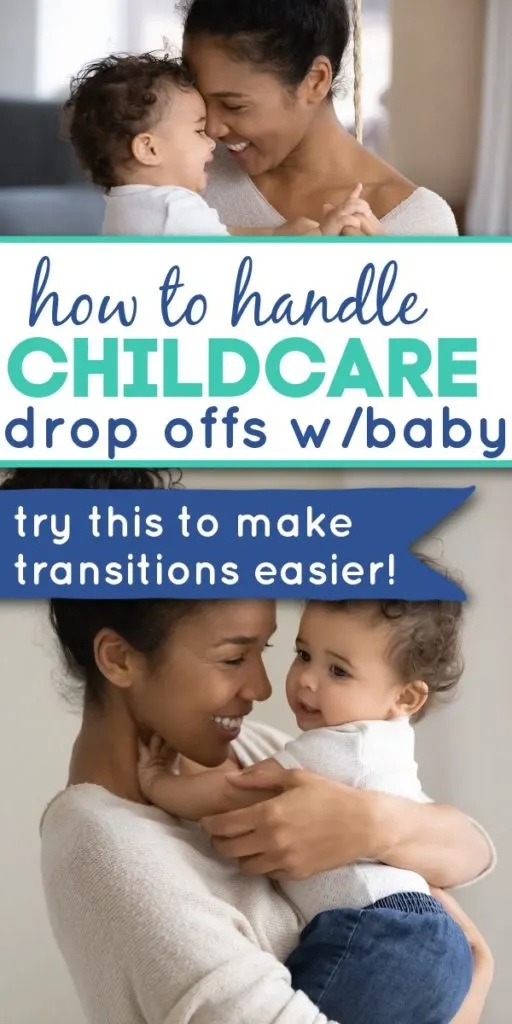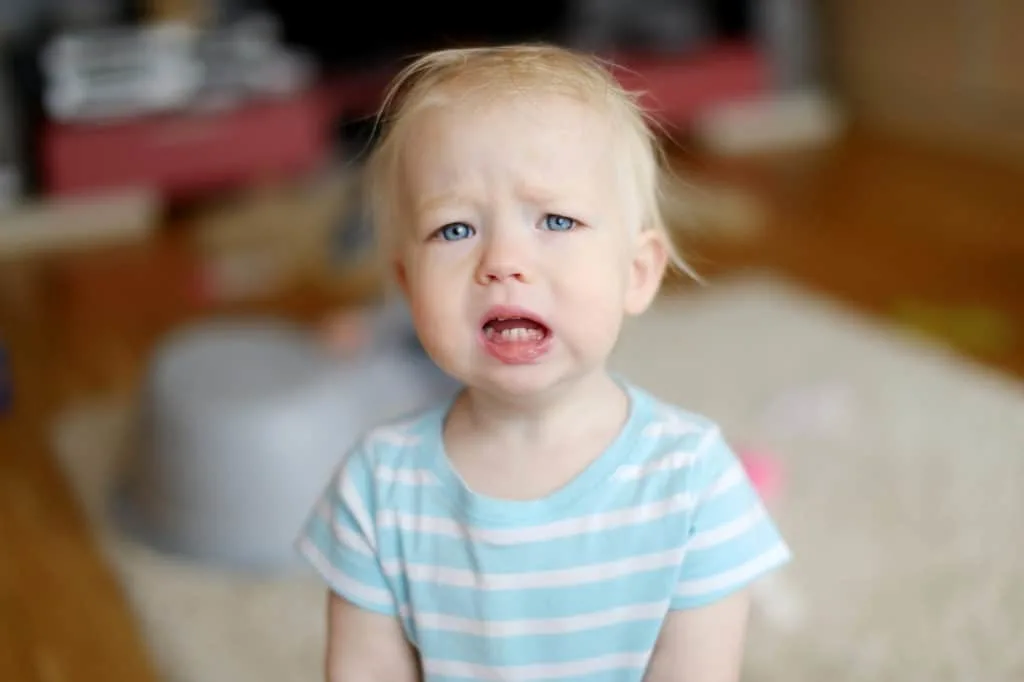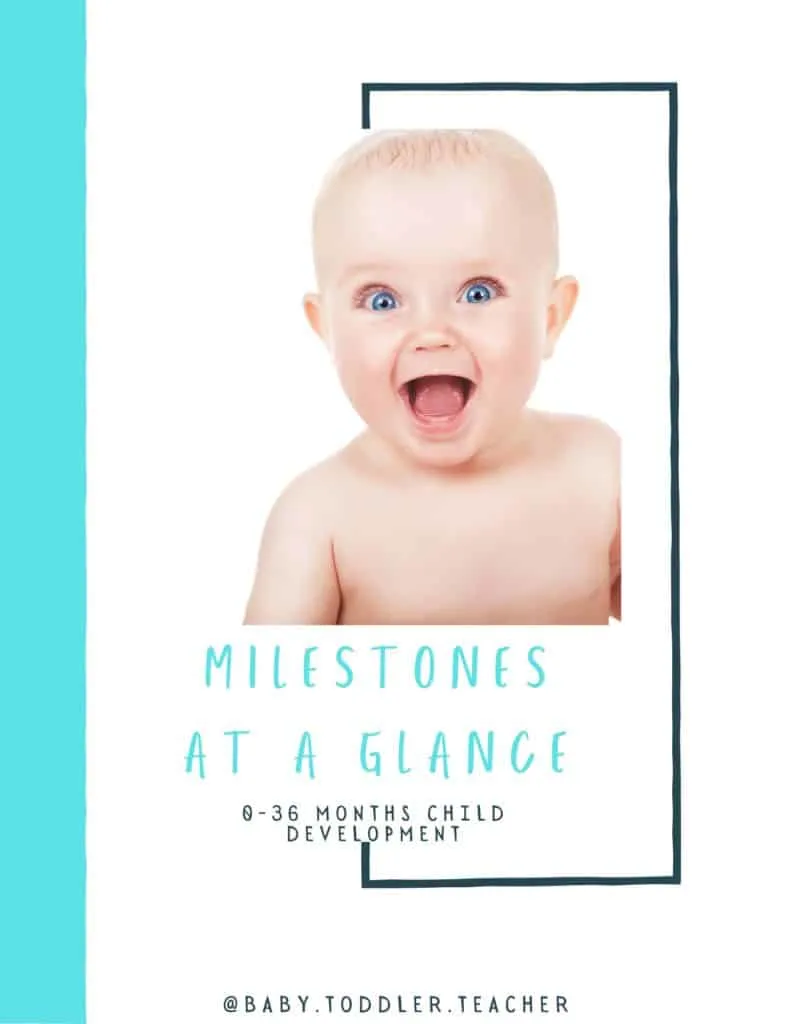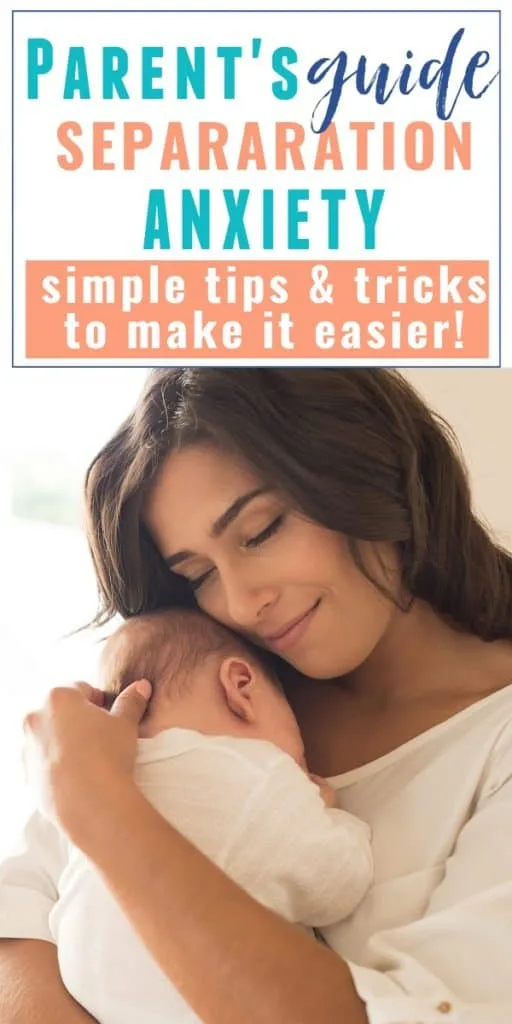Separation anxiety is a common thing for babies, but it can cause worry and sadness for parents.
It’s important to learn how separation anxiety in babies works so you can support your baby through it!
In this post You will find information about:
- When does separation anxiety start?
- What are the signs of separation anxiety in babies?
- How long does separation anxiety last?
- How do you stop separation anxiety in babies?
- How to Deal with Separation Anxiety in Babies
- Separation Anixiety in Babies at Night
- When does separation anxiety peak?

When does separation anxiety start
Your baby was so happy and content for the most part but then it suddenly changes.
Now the minute you get up to go to the bathroom they are crying their eyes out!
The sudden change is most likely separation anxiety setting in.
It can be really difficult and frustrating if this happens all of a sudden without any warning signs.
When separation anxiety starts depends on each baby because it’s different for every person but generally, it is when your baby is about 4-6 months old.
Keep in mind if your baby was born early you will want to go by adjusted age.
What are the signs of separation anxiety in babies?
Some of the signs of separation include:
– Crying or fussiness
– Difficulty falling asleep when put down for a nap, bedtime, separation from the caregiver.
-Cry or fuss when the caregiver leaves their sight for even a short amount of time
– Fussiness when brought out to meet new people.
-Your baby may not be content when being held by others.
-Strong preference towards one main caregiver.
-Babies is upset when dropped off at childcare or left with a babysitter
If you are starting to see some of these signs then chances are your child’s separation anxiety has started.
How long does separation anxiety last?
How long separation anxiety lasts will be different for every child.
It may last for a few weeks or months depending on the child.
There is a chance that it may go away for a while or seem “better”, then all of a sudden come back again out of nowhere.
With some kids, it may seem more intense and not as noticeable in others.
For example, my son separated fairly easily even through toddlerhood.
Part of this may have been his temperament, or it may have been because we had him in childcare starting at about 3 months old until he was about 9 months old when we took him out and I stayed home with him.
I remember struggling a lot with my daughter’s separation anxiety when she was around that 6-9 months age and even as a 3-year-old she still will struggle sometimes when I leave.
When she was a baby I did lots of babywearing to help soothe her and make her feel safe.
As a toddler, we needed to be prepared for these transitions to give her a warning and make her feel comfortable.
How do you stop separation anxiety in babies?
Separation anxiety is a normal part of typical development and completely normal so we can’t stop it, unfortunately.
However, we can support our babies and help them through separation anxiety while building a healthy bond with them.
One of the reasons separation anxiety occurs is because your baby starts to understand object permanence.
For example, you are playing with them and then leave for a minute to get something or go to the bathroom. When they can’t see you anymore they start to think that maybe you have left forever!
So separation anxiety is really about your baby getting used to the idea of object permanence which is when an object continues existing even if it is not right there.
Playing a simple game of peek-a-boo with your little one is one way that you can start showing them this concept and a great way to encourage childhood development in general.
Play peekaboo during playtime or even while changing their diaper so they can get lots of repetitive practice
We can do this by providing a coping toolkit for your child to use in the moment of separation or stress, such as:
Packing their favorite toy or special blanket before leaving (if they are old enough):
Use a transitional object to help your child feel secure when leaving your little one at child care or with other caregivers as part of your goodbye ritual.
I remember packing my son’s stuffed puppy before we left to go on outings because it helped him feel safe and comforted.
He still seeks this toy out when he is upset and will sleep with it as well even as a 5-year-old.
Even if they don’t have separation anxiety, this is a good tool for any child to use when leaving somewhere new or being dropped off at childcare.
Keeping a photo of you with them to look at:
If you are going to be apart for a while, you can take a picture with them and let them look at it when they need comfort.
This also works great if separation anxiety comes on unexpectedly or out of the blue.
If the caregiver has something for the child to look at that makes them feel safe it can help calm them down.
Leave something with your scent:
If you are going out for the day, leave them something like a t-shirt with your scent on it with the caregiver.
This can soothe a child as your scent is something safe and comforting to them.
Start with Short Periods of Being Away:
It can be difficult to leave your baby whether they have separation anxiety or not, but it is important for them to learn that you will always come back.
If possible, start with short periods of separation and slowly work up from there as the child gets older and you feel comfortable doing so.
How to deal with separation anxiety in babies
When separation anxiety occurs it is good to have a plan.
The separation anxiety coping tools mentioned above are helpful for parents and they will also help your baby feel more confident and comfortable.
There are also a few other things you can do to ease the transition.
If you can have your child meet their new caregiver ahead of time, even for a short period this can help them get more familiar with them.
My daughter had an amazing preschool teacher when she was about 18 months old.
This was one of the first times I had left her with anyone and I was so nervous.
This preschool classroom was made up of little walkers so children that were about 15-24 months…which is exactly when separation anxiety peaks for most kids.
When I first met the teacher she greeted me in a super friendly and warming manner and gave me a hug.
I was slightly surprised by this….as I am not much of a “hugger” myself.
Then she explained that if we were comfortable with each other that it would then model and show my daughter that she was a safe and trusted person.
What a wonderful idea…and it worked!
The kid’s all struggled a bit at first but before we knew it there were no issues when dropping her off.
The really interesting thing is my daughter still remembers this teacher so fondly even as a 3-year-old.
Children are watching us ALL OF THE TIME.
They can sense if we are nervous or scared…they will become nervous or scared as well.
So try to show your child that the person you are leaving them with is someone you love and trust as well.
How to Make the Transition Easier When You are Separating
Here are some ways you can support young babies or toddlers when separating:

Avoid Sneaking Out With out Saying Good Bye:
Sneaking out of a child’s room or hiding from them is not being honest and can cause even more stress on your child.
It can seem like a great idea to have someone distract them while you slip out but it can increase separation anxiety.
It is better for them to see that you are leaving and say goodbye even if they don’t understand what a “goodbye” really means at this point.
They will learn from watching your actions…we want to build trust with them so that they can eventually feel confident with the separation instead of uncertainty.
Create a Consistent Exit Ritual:
When you are separating from your child, having a ritual that is consistent every time can be helpful.
It helps them feel safe and secure knowing exactly what to expect each time you leave them with someone else.
It could be something like singing a quick song or a snuggle and hug goodbye..having this separation ritual can make it easier on both of you.
Separation anxiety in babies at night
Does your baby wake up at night crying and seeking out comfort from you?
Both of mine did…and how did I handle it?
I went to them…I rocked them…I snuggle them…I comforted them.
Am I a sleep expert? Nope.
That is what I felt was best to do for me and my little ones. It felt right.
This is how I think about it.
We know that it is important to comfort our babies when they are upset during the day…what makes nighttime any different?
One thing that you can do is have your baby sleep in the same room as you.
Room sharing can be a great way to stay close to your little one so that both of you can get a good night’s sleep.
It is recommended by the AAP to room share ideally for the first year of your child’s life.
There are programs like (this one) that have ways to comfort your baby but also support them to build healthy sleep habits.
When does separation anxiety peak
Separation anxiety usually peaks for little ones around 12-18 months.
This separation anxiety time can be the most difficult…and trying.
Sometimes separation anxiety persists through toddlerhood and may be present for times during the preschool years as well.
Separation Anxiety Causes Stress on Parents Too
It’s never easy to see your baby go through separation anxiety, but know that you are not alone!
All parents experience this with their child and this is something that will get better with time.
We hope these tips have been helpful in understanding how to support your little one best when they experience discomfort when separating from you.
To find more helpful parenting resources click here.
No!
Ignoring separation anxiety can be extremely harmful to your baby and their emotional well-being.
It is important to confront separation anxiety head on…don’t ignore it as acting like nothing is wrong will make things worse for everyone in the long run.
Keep in mind all babies will develop at their own pace, however, most babies will start to show some signs of separation anxiety around 4-6 months.
Separation anxiety can be extremely stressful for everyone involved…but it also means that your baby has developed an attachment with you and trusts you as well.
Related Posts you Will Enjoy
Best Toys for 6-Month-Old Babies
3 Surprising Things You Didn’t Know Were Part of Typical Development
The Easy Way to Introduce Infant Math Skills
Parenting Resources for Babies and Toddlers You Need Today!

Grab your FREE Milestone Guide HERE.


Kayla O’Neill has a master’s degree in education as well as a bachelor’s degree in special education with an emphasis in early childhood education. She has been working as a developmental therapist with babies and toddlers in early intervention since 2012. She is also a mom with two young children.